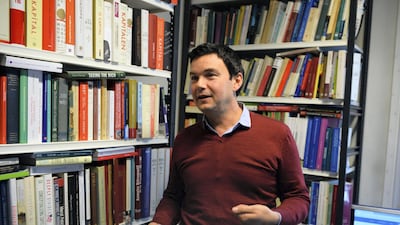Economics is generally taught as if Adam Smith, and other members of the 18th century Scottish Enlightenment (such as David Hume) were the starting point for the modern version of the discipline. Occasional reference is made to the contributions of Ibn Khaldun, the 14th century Muslim polymath. but for the most part, 21st century Muslims are left with the impression that their ancestors had little or nothing to do with the discipline.
This narrative is challenged by Abdul Azim Islahi, a professor at Jeddah's Islamic Economics Institute, in his 2014 book “The History of Islamic Economic Thought”. Professor Islahi's book's primary contribution is a thorough description of the intellectual achievements of Muslim economists during the Middle Ages — an era when Europeans were scientifically stagnating.
Islahi details the process by which Muslim scholars went about extracting economic insights from the Quran and the Prophet’s Sunnah on issues such as inheritance, financial intermediation, and investment partnerships; how they synthesized this with the contributions of the ancient Greeks, which they translated into Arabic; and how they translated their syntheses into the prevailing European tongues, allowing Islamic principles to join the list of antecedents to modern economics.
He goes on to argue that scholars who studied the analyses of such proto-economists, and went on to make their own contributions, systematically failed to acknowledge the work of Islamic scholars. Religious hatred of Muslims, he speculates, may have played a role in such a failure.
When I studied economics between 1998-2007, I had zero exposure to the contributions of the Muslim proto-economists working during the Middle Ages, I’m pretty confident that the same is true for almost all of my colleagues across the world. However, the history of economic thought in general—and not just Muslim components—gets weak to zero coverage in most economics degrees, meaning that this is not just an anti-Muslim phenomenon.
One of the consequences is that today, economists are studying from scratch the phenomena that the Quran and Sunnah discuss, resulting in some minor reinventing of the wheel. A salient example is financial intermediation in the wake of the global financial crisis.
Many have concluded that the high-amplitude boom-and-bust cycle of modern financial markets is an inevitability, along with its adverse effects on the rest of the economy. However, Islamic principles of banking partially exist as a way of preemptively diminishing the amplitude of—and fallout from—the financial bubbles that subvert the economy’s stability. Non-Muslim academics working in the field have now acknowledged that the “Islamic economy” merits study, and that it can contribute solutions to some of the most pressing problems of today.
________________
Read more:
Economics 101: research studies are not easily swayed by conflict of interests
Economics 101: Gulf states can harness population growth to their advantage
Economics 101: Saudi lifting cinema ban can help boost region’s entertainment sector
________________
A more recent example is the best-selling book “Capital” by Thomas Piketty, which analyses the causes of global inequality. Piketty concludes by arguing that regular consumption and income taxes are relatively ineffective means of tackling inequality, and that the a global 2 per cent wealth tax is a superior alternative. This number should immediately ring a bell for any Muslim, since the zakat (almsgiving), which loosely translates to a 2.5 per cent wealth tax, is one of the five pillars of Islam.
Does Piketty even realise this? I’m not sure, and I don’t blame him even if he doesn’t, since the whole economics profession—including me—is highly ignorant of what Muslim proto-economists did prior to Adam Smith. But economists who take the time to read the rules regarding zakat may find some intellectual insights that help refine the “Piketty tax”.
For example, Islam makes quite specific stipulations about who is eligible to receive zakat, what forms zakat can take, who gets priority among people who are equally eligible nominally, and many other dimensions. Moreover, many of these rules are accompanied by logically-sound justifications, which can contribute to building a more refined framework for charitable donations for Muslims and non-Muslims alike.
This point deserves emphasis. Governments around the world do not currently seem to have much of an idea of what to do about inequality, though most would agree that both within-country and between-country inequality are becoming serious risks to peace and stability. Just look at the attention that politicians and media are giving to the issue of illegal migration at the moment, which is a direct symptom of global inequality.
This is why a primary maxim of the United Nations Sustainable Development Goals (SDGs) is ensuring inclusive economic development, and limiting the emergence of the sorts of inequity that undermine societal well-being. The details of how to do this are still being worked out, though presumably the SDG framework is a good way of systematizing the practical evidence on what does and does not work.
The fact that such concerns have been mooted by Islamic scholars long before Adam Smith came on the scene suggests that economists should pay greater attention to their contributions to the discipline. Islahi's book is a very good place to start for those seeking academic honesty and justice, as well as those looking for fresh ideas on how to solve global problems.
Omar Al-Ubaydli (@omareconomics) is a researcher at Derasat, Bahrain.


